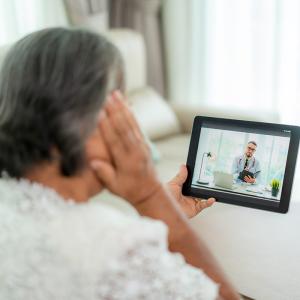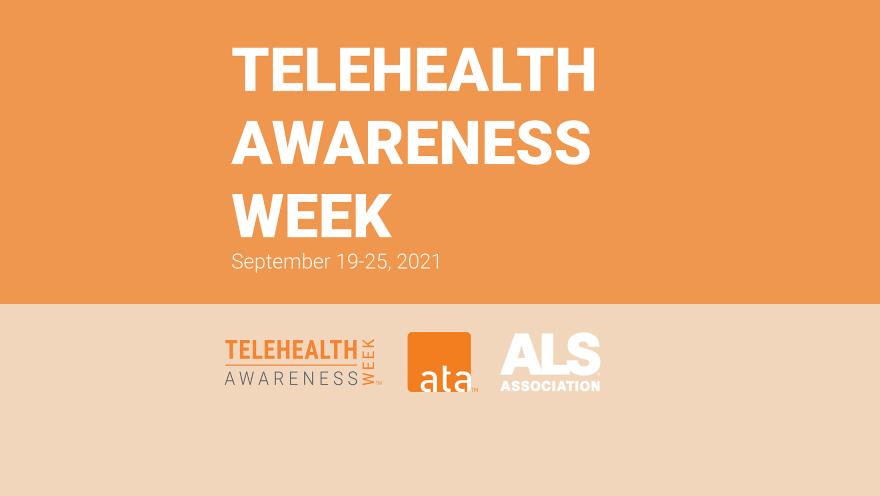In the wake of the unprecedented challenges our health care system has faced since the start of the COVID-19 public health emergency, one message has become abundantly clear: Telehealth is Health. As national lockdowns threatened to restrict access to quality care for millions of patients, telehealth played a critical role in supporting the delivery of health care services. The ALS Association is proud to be part of a diverse coalition of individuals and organizations committed to advancing virtual care during the inaugural Telehealth Awareness Week presented by the American Telemedicine Association, taking place September 19-25.
Telehealth has been an important element in U.S. health care for decades, but the COVID-19 public health emergency has put a spotlight on the need to maintain and expand access to telehealth to ensure everyone can receive appropriate care when and where they need it. Following the unprecedented use of virtual care services in response to COVID-19, telehealth now represents 15 to 20 percent of care delivery, confirming the need to create a two-channel health care system that balances in-person and virtual care.
Telehealth expansion during the public health emergency offered a crucial lifeline to people living with ALS. Because of the loss of motor function brought on as the disease progresses, people with ALS were in the highest risk category from serious illness or death from a COVID infection. In addition, family caregivers, who provide support for activities of daily living for their loved ones with ALS, also feared bringing a deadly COVID infection home.
Once federal and state governments made telehealth available, people with ALS were able to continue to receive critical multidisciplinary care from ALS health care experts. In addition, telehealth enabled specialized ALS clinics across the country to cover a much broader geographic area -- including across state lines. This enabled them to reach people with ALS who might not have been able to travel the distance to a clinic. Expanded access to telehealth also allowed remote clinical trial options to people living with ALS - allowing them to try investigational drugs and keep clinical trials going.

At the beginning of the pandemic, The ALS Association in immediately recognized the fact that the list of telehealth eligible services did not include several key codes related to speech generating devices and breathing support. Working in partnership with the American Speech-Hearing and Language Association and Congressional champions, The ALS Association was able to convince the Medicare program to add five codes to those covered under telehealth. This took several months and involved direct lobbying of the Centers for Medicare and Medicaid Services and generating support from key members of Congress, but the codes were finally added to the list of those that can be reimbursed when provided via telehealth.
There is still work to be done.
The ALS Association is focused on making sure that people living with ALS are able to receive telehealth coverage after the public health emergency is declared over. While there is no replacement for a visit to a multidisciplinary ALS Clinic, telehealth has dramatically increased access to all health care for people living with ALS, provided new opportunities for specialized ALS multidisciplinary care and enabled participation in remote clinical trials. One new challenge is that some governors have revoked the opportunity for out-of-state physicians to provide care via telehealth. This means that a person in South Carolina who had been receiving ALS specialty care via telehealth from an ALS clinic in North Carolina is no longer able to do so. Second, it is unclear what kind of telehealth Congress and CMS will allow after the PHE ends. The ALS Association fully supports access to telehealth after the pandemic.
During Telehealth Awareness Week, The ALS Association is joining a range of stakeholders, including leaders in health care and patient advocacy, in highlighting the growing acceptance and value of virtual care. Through our collective efforts, we have a special opportunity to deliver new informational resources to support broader access to telehealth for patients, caregivers and health care providers. We encourage everyone help us build telehealth awareness this September and amplify our most important message: Telehealth is Health!
To learn more about activities planned for Telehealth Awareness Week and opportunities to participate, visit the official Telehealth Awareness Week website here: TelehealthAwareness.org.


Join the conversation. Please comment below.